
Chris Upton looks at a much-derided hero of liberty, equality and fraternity.
I’m sure you noticed that last year was heaving with anniversaries.
Every historical figure, it seemed, was celebrating a significant birthday, from Wedgwood to Darwin, from Boulton to Purcell.
One man, however, missed out on the universal plaudits, unless you happened to visit the place of his birth. In the town of Thetford in Norfolk they proudly strung up the bunting (or, at least, made space in the museum) to honour of their famous son, Thomas Paine. 2009 marked the bicentenary of his death.
Born in Norfolk, Thomas Paine spent most of his adult life abroad. He was in the United States to see the American Revolution, then in France to see the French equivalent a few years later. He ended his days at New Rochelle, a farm given him in gratitude by the state of New York.
No-one connects the two great revolutionary states more perfectly, except perhaps Benjamin Franklin and the Statue of Liberty.
Tom Paine would have won no popularity contests, either in his lifetime or today and every “bush tucker challenge” would undoubtedly have come his way. He did not believe in religion – not, at least, in any orthodox sense – and did not believe in monarchy. Even those who took him to their hearts eventually turned against him. Robespierre had Paine imprisoned for refusing to condone the execution of Louis XVI, while George Washington turned his back on him for his atheism.
Even in his choice of careers, Tom Paine made decisions that courted ridicule, if not active derision. He was, by the trade of his father, a corset-maker, re-trained as an exciseman, before turning to politics and philosophy. And he was, in much of his writings, a journalist and pamphleteer.
Yet in his writings, Paine was a man for all time, a harbinger of democracy and the purest of all political thinkers. Perhaps it was this purity which stuck in the throats of practical politicians, whose achievements fell below the ideals that Paine espoused.
One book, more than any other, gave Paine universal fame, if not universal admiration. The Rights of Man, written in 1791-2, is full of the idealism and sense of a new dawn that marked the early days of the French Revolution. Written in response to Edmund Burke’s Reflections on the Revolution in France, Paine acted as the propagandist and advocate of the revolution and called for a similar uprising in England. You can imagine how well that went down in Whitehall.
Paine’s words shook the English establishment to its core. It was hard enough to cope with the idea that their nearest neighbours had overthrown the monarchy, without hearing it from the mouth of an Englishman. As England and France drifted towards war in the early months of 1793, it was no longer possible – this side of the Channel – to espouse the cause of “liberty, equality and fraternity” without being accused of treason.
A narrow kind of nationalism became the only true faith: loyalty to the King, support for the Constitution and a hatred of all things French, including, by association, Tom Paine. Overnight, almost by decree, Paine became Public Enemy No. 1 and The Rights of Man was outlawed. In the summer of 1793, a number of booksellers and printers in Birmingham were arrested for publishing and selling the unholy book.
In February 1793, an effigy of Paine was paraded through the streets of the town, accompanied by a “judge” and an “executioner” (dressed as chimney sweeps), and hanged on a gallows 20 feet high. Effigies of Paine, Robespierre and Joseph Priestley were likewise hanged and burnt at Stafford, and Paine was also incinerated at Worcester and Warwick.
At Dudley, a crowd even deployed the whipping post – reserved for official floggings – as a makeshift gallows and hanged “Citizen Paine” in front of the Town Hall.
This kind of riotous behaviour would, in normal circumstances, have resulted in arrests. Not so, this time. This was exactly the kind of reaction the loyalists wanted.
But Thomas Paine’s message, denied and suppressed in 1793, would not go away. A generation later, England was to go through its own political upheaval. There was no bloody revolution, but there was reform and there was Chartism and Tom Paine, dead for 30 years, would walk the streets again.
The missionaries of the Congregationalist Church, who went among the Birmingham poor in those turbulent years, found Tom Paine alive and well and (as they saw it) continuing to poison the minds of the lower classes. One of the missionaries, Edwin Derrington, found one such adherent in a back-to-back house in Digbeth. “A young man in the court,” wrote Derrington in his journal in 1838, “is imbibing Tom Paine’s sentiments and the testimony of his wife is that he has been a worse husband ever since...” Paine, apparently, had encouraged the man to beat his wife.
Another man in Canal Street was said to be reading nothing but Voltaire and Paine, “and his vices have ruined his constitution,” commented Derrington, ruefully.
So Tom Paine could add wife-beating and drunkenness to his long list of sins. It seems that, a generation after his death, the man from Thetford was no more palatable to Church and King than he had been in his lifetime.


















